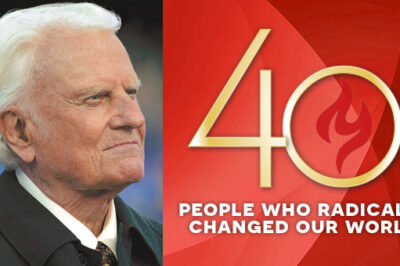The most recognizable evangelist in modern history, Billy Graham preached to some 215 million people in more than 100 countries—and another 2 billion via radio and TV—before ceasing public speaking in 2006.
While never discussing a classic charismatic experience, Graham’s writings included an emphasis on the work and power of the Holy Spirit.
His two appearances on the cover of Charisma symbolize how Graham reached beyond his Southern Baptist roots to unite evangelicals, charismatics, Pentecostals and mainline denominations in soul-winning. Through the years, more than 3 million people signed cards at his meetings, affirming their decision to follow Christ.
North Carolina’s governor honored Graham in 2013 as the state’s “Favorite Son.” On the eve of his 97th birthday this November, the North Carolina Museum of History will unveil an exhibit on his faith journey.
Historian Grant Wacker, whose 448-page biography of Graham released last November, says the evangelist probably preached to more people than anyone in history, with the exception of Pope John Paul II. The retired Duke University professor identifies the magnitude of Graham’s ministry and personal charm as reasons the evangelist is special in the annals of the church.
“He’s extraordinary,” Wacker says. “His charisma is unparalleled. When I met him, he was in his 90s. The man fills the room. The three distances he traveled were to Christ, to racial reconciliation and to (support for) nuclear disarmament. I think it’s remarkable where he traveled.” The author says what isn’t often recognized about Graham is the extraordinary complexity of the evangelist’s mission, which included multiple crusades, radio and TV broadcasts, newspaper columns and books. In addition to traditional broadcast and print outlets, in more recent times the Billy Graham Evangelistic Association (BGEA) has added new media to its outreach. Oldest son Franklin, who now leads BGEA, uses Facebook and Twitter.
Franklin credits his father’s steadfastness in preaching the gospel as the most significant aspect of the famed evangelist’s legacy. He notes how Billy once delivered the same message (from John 3:16) in Oxford, England, to a highly educated audience that he had a week earlier to a mostly illiterate crowd in Nigeria. In both cases, numerous people responded to his invitation to follow Christ.
This focus led the evangelist to resist a suggestion by a board member years ago that the association consider dropping “evangelistic” from its name. Graham replied that he would remove his own name from the ministry before he consented to taking out any mention of evangelism. Graham also crossed racial barriers in the early 1950s, a time when many Americans accepted segregation as the norm. At a crusade in the South, after the head usher refused Graham’s request to take down ropes designed to separate blacks and whites, the evangelist left the stage and did it himself. The gesture opened doors with civil rights leader Martin Luther King Jr. and his African-American followers.
“My father was just willing to include the races in his ministry because he felt the ground was level at the foot of the cross,” Franklin says. “Christ died for all men. He made great strides to bridge the segregation issue.”
Humility was another aspect of Graham’s character that his protégé, Luis Palau, observed during one of the many conferences Graham convened for evangelists. The 1978 meeting in Germany prompted a convert from an earlier Graham meeting to approach Graham with a request. Although the convert had 17 members on his teams, he had no invitations to conduct evangelistic meetings: “Can you help me?”
After offering some advice, Graham suggested they pray. After the visitor prayed, so did Graham, but Palau noticed the evangelist’s voice growing muffled. When a curious Palau opened his eyes, he saw Graham lying flat on his face as he asked God to provide the young man with opportunities to preach. “When the man left, I made a comment about that, and Billy said, ‘The Bible says (1 Peter 5:6) to humble yourself before the mighty hand of God and in due time He will lift you up. I take that at face value. If you do that, He will do it for you too,'” Palau says. “To see this great servant of God meeting this young evangelist and humbling himself was amazing. He’s such a man of God and a spiritual person. To even be compared to him is embarrassing.”
Franklin identifies his father’s integrity as another hallmark of his ministry. Not only was BGEA one of the first organizations to make outside audits available to ministry supporters, Billy played a key role in establishing the Evangelical Council for Financial Accountability. Wacker says that Graham not only had a spotless financial record, but he also helped evangelicals achieve broader recognition in public life.
“The thing about people making a commitment to Christ is the most significant thing, but beyond that, he brought evangelicals into the mainstream, past Sunday,” Wacker says. “(Historian) Samuel Hill said Billy Graham taught American evangelicals when to wear a necktie.”—Ken Walker







Leave a Comment
You must be logged in to post a comment.